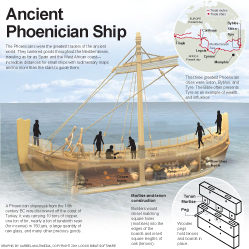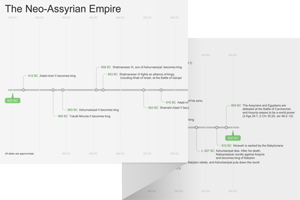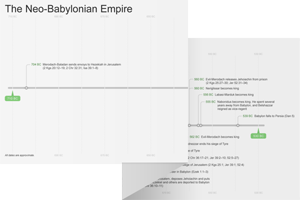23:1–18 The Phoenician cites of Tyre and Sidon, Israel’s near neighbors to the northwest, were popular targets in prophetic oracles against surrounding nations (e.g., Ezek 26:2–28:24; Joel 3:4–8; Amos 1:9, 10; Zech 9:2–4). The Phoenicians were a major influence on Canaanite idolatry, which may explain the prophets’ indignation. King Ahab, one of Israel’s most powerful kings during the divided monarchy, married Jezebel, a princess of Sidon. First Kings 16:31 describes the role played by Baal worship in this alliance. |
23:1 The oracle of Tyre Unlike Isa 21:1 and 22:1, the oracle about Tyre resumes the pattern seen in 19:1; 17:1; 15:1; 13:1, where the city or nation is explicitly identified. Tyre was a seaport; the Phoenicians were well-established seafaring traders.
resumes the pattern seen in 19:1; 17:1; 15:1; 13:1, where the city or nation is explicitly identified. Tyre was a seaport; the Phoenicians were well-established seafaring traders.
 Oracles Against the Nations Table
Oracles Against the Nations Table
Tarshish A distant port where the Phoenicians traded. The oracle begins by addressing those who conduct business with Tyre, drawing their attention to the destruction of the city (see 2:16 and note; Jonah 1:3 and note).
Cyprus Another Mediterranean trading partner.
23:2 merchant of Sidon Sidon was another prominent Phoenician city-state located north of Tyre along the Mediterranean coast.
23:3 the seed of Shihor, the harvest of the Nile The Phoenicians traded with Egypt, bringing Egyptian grain and produce to Canaan and other Mediterranean locations.
the merchandise of the nations The Phoenicians were international traders. Their economic influence encouraged most nations around the Mediterranean to maintain positive relations with them.
23:4 I was not in labor The sea itself is disclaiming ownership of those who considered themselves her children.
23:5 When the report comes to Egypt The news of Tyre’s destruction will spread to her main trading partners—Egypt and Tarshish (see Isa 23:6).
23:6 Cross over to Tarshish The news spreads to Tarshish. See note on v. 5.
Wail, inhabitants of the coast Refers to the Phoenicians, who should mourn the loss of their flagship city.
23:7 Her feet brought her to dwell afar as an alien Tyre founded Phoenician colonies around the Mediterranean, such as Carthage.
23:8 Who has planned this against Tyre, the bestower of crowns, whose merchants were princes, her traders the honored ones of the earth? The question of who could have brought down such a powerful center of influence is answered in v. 9.
her traders the honored ones of the earth The power to control trade exports throughout the Mediterranean brought a significant prestige to the Phoenicians.
23:9 the pride of all glory The prestige of their status as international merchants manifested in pride. As with other pronouncements of judgment in Isaiah, pride is the chief sin that demands punishment.
23:11 He has stretched his hand out over the sea Echoing the actions of Moses in Exod 14:21, Yahweh’s hand is stretched out in an act of judgment and an assertion of power over the chaotic ancient and primeval forces represented by the sea (see Isa 10:4; 9:12).
23:12 You will not continue to exult Though Tyre was destroyed, Sidon should not gloat that she was spared.
23:13 Look at the land of the Chaldeans Babylon is presented to Tyre as an example. This may be a recommendation to watch the fate of another power that rebelled against Assyria, or a warning to indicate the direction this prophesied destruction will come from.
This people no longer exists May indicate the extent to which Babylonian power was suppressed while Assyria was strong.
Assyria destined it for wild animals Assyria violently put down a rebellion and nearly destroyed Babylon in 689 bc.
23:15 on that day: And Tyre will be forgotten Tyre will experience 70 years of decline. The time of this period of decline is unknown; 70 years may be a symbolic number indicating the complete loss of a generation.
23:16 forgotten prostitute Tyre is metaphorically described as a prostitute based on her willingness to consort with any and all nations for profit (see Isa 23:17).
23:17 at the end of seventy years After 70 years of decline, Tyre will be back in business.
23:18 her merchandise and her harlot’s wages will be set apart The scene shifts to a future time when the nations all serve Yahweh (see 2:2–4). Tyre is back in the trading business, but now serves the true God.

|
About Faithlife Study BibleFaithlife Study Bible (FSB) is your guide to the ancient world of the Old and New Testaments, with study notes and articles that draw from a wide range of academic research. FSB helps you learn how to think about interpretation methods and issues so that you can gain a deeper understanding of the text. |
| Copyright |
Copyright 2012 Logos Bible Software. |
| Support Info | fsb |
 Loading…
Loading…





